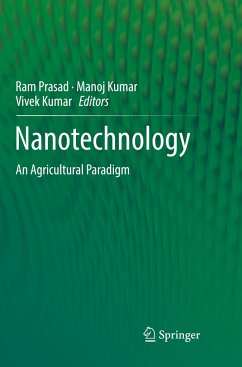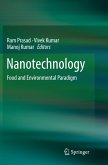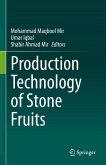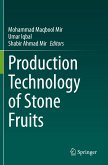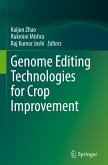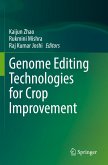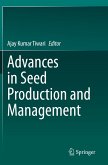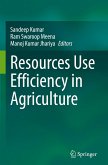Nanotechnology
An Agricultural Paradigm
Herausgegeben:Prasad, Ram; Kumar, Manoj; Kumar, Vivek
Nanotechnology
An Agricultural Paradigm
Herausgegeben:Prasad, Ram; Kumar, Manoj; Kumar, Vivek
- Broschiertes Buch
- Merkliste
- Auf die Merkliste
- Bewerten Bewerten
- Teilen
- Produkt teilen
- Produkterinnerung
- Produkterinnerung
This book highlights the implications of nanotechnology and the effects of nanoparticles on agricultural systems, their interactions with plants as well as their potential applications as fertilizers and pesticides. It also discusses how innovative, eco-friendly approaches to improve food and agricultural systems lead to increased plant productivity. Further, it offers insights into the current trends and future prospects of nanotechnology along with the benefits and risks and their impact on agricultural ecosystems.
Nanomaterials in agriculture reduce the amount of chemical products…mehr
Andere Kunden interessierten sich auch für
![Nanotechnology Nanotechnology]() Nanotechnology121,99 €
Nanotechnology121,99 €![Production Technology of Stone Fruits Production Technology of Stone Fruits]() Production Technology of Stone Fruits145,99 €
Production Technology of Stone Fruits145,99 €![Production Technology of Stone Fruits Production Technology of Stone Fruits]() Production Technology of Stone Fruits145,99 €
Production Technology of Stone Fruits145,99 €![Genome Editing Technologies for Crop Improvement Genome Editing Technologies for Crop Improvement]() Genome Editing Technologies for Crop Improvement145,99 €
Genome Editing Technologies for Crop Improvement145,99 €![Genome Editing Technologies for Crop Improvement Genome Editing Technologies for Crop Improvement]() Genome Editing Technologies for Crop Improvement105,99 €
Genome Editing Technologies for Crop Improvement105,99 €![Advances in Seed Production and Management Advances in Seed Production and Management]() Advances in Seed Production and Management161,99 €
Advances in Seed Production and Management161,99 €![Resources Use Efficiency in Agriculture Resources Use Efficiency in Agriculture]() Resources Use Efficiency in Agriculture186,99 €
Resources Use Efficiency in Agriculture186,99 €-
-
-
This book highlights the implications of nanotechnology and the effects of nanoparticles on agricultural systems, their interactions with plants as well as their potential applications as fertilizers and pesticides. It also discusses how innovative, eco-friendly approaches to improve food and agricultural systems lead to increased plant productivity. Further, it offers insights into the current trends and future prospects of nanotechnology along with the benefits and risks and their impact on agricultural ecosystems.
Nanomaterials in agriculture reduce the amount of chemical products sprayed by means of smart delivery of active ingredients; minimize nutrient losses in fertilization; and increase yields through optimized water and nutrient management. There is also huge potential for nanotechnology in the provision of state-of-the-art solutions for various challenges faced by agriculture and society, both today and in the future.
Nanomaterials in agriculture reduce the amount of chemical products sprayed by means of smart delivery of active ingredients; minimize nutrient losses in fertilization; and increase yields through optimized water and nutrient management. There is also huge potential for nanotechnology in the provision of state-of-the-art solutions for various challenges faced by agriculture and society, both today and in the future.
Produktdetails
- Produktdetails
- Verlag: Springer / Springer Nature Singapore / Springer, Berlin
- Artikelnr. des Verlages: 978-981-13-5172-3
- Softcover reprint of the original 1st edition 2017
- Seitenzahl: 380
- Erscheinungstermin: 12. Dezember 2018
- Englisch
- Abmessung: 235mm x 155mm x 20mm
- Gewicht: 644g
- ISBN-13: 9789811351723
- ISBN-10: 9811351724
- Artikelnr.: 54795486
- Herstellerkennzeichnung Die Herstellerinformationen sind derzeit nicht verfügbar.
- Verlag: Springer / Springer Nature Singapore / Springer, Berlin
- Artikelnr. des Verlages: 978-981-13-5172-3
- Softcover reprint of the original 1st edition 2017
- Seitenzahl: 380
- Erscheinungstermin: 12. Dezember 2018
- Englisch
- Abmessung: 235mm x 155mm x 20mm
- Gewicht: 644g
- ISBN-13: 9789811351723
- ISBN-10: 9811351724
- Artikelnr.: 54795486
- Herstellerkennzeichnung Die Herstellerinformationen sind derzeit nicht verfügbar.
Dr. Ram Prasad is Assistant Professor at the Amity Institute of Microbial Technology, Amity University, Uttar Pradesh, India. His research interest includes plant-microbe-interactions, sustainable agriculture and microbial nanobiotechnology. Dr. Prasad has more than hundred publications to his credit, including research papers & book chapters and five patents issued or pending, and edited or authored several books. Dr. Prasad has eleven years of teaching experience and he has been awarded the Young Scientist Award (2007) and Prof. J.S. Datta Munshi Gold Medal (2009) by the International Society for Ecological Communications; FSAB fellowship (2010) by the Society for Applied Biotechnology; Outstanding Scientist Award (2015) in the field of Microbiology by Venus International Foundation; and the American Cancer Society UICC International Fellowship for Beginning Investigators (USA, 2014). In 2014-2015, Dr. Prasad served as Visiting Assistant Professor in the Department ofMechanical Engineering at Johns Hopkins University, USA. Dr. Manoj Kuma r is a scientist with sanguine behavior who is adoring about research and development, with a commitment to lifelong learning. He is determined on high quality science that contributes broadly to both increasing intellectual knowledge of plant development and to increasing the ecological niche. He has a high level of professional desire and intellectual hunt, and the potential to fulfil the dream of his high impact publications and the future recognition of these by academic peers. Dr. Kumar has pursued his PhD in Plant Biotechnology from prestigious Jawaharlal Nehru University and then awarded two postdocotoral fellowships consecutively: i) DBT-PDF from IISc Bangalore in 2005 and then NRF-PDF from University of Pretoria. Dr. Manoj Kumar is a researcher of Plant Biotechnology in the Division of Microbial Technology at the Amity University Uttar Pradesh, India. He referees for many more, including Phytoremediation, Journal of Soil Sediments and many more. Dr. Kumar's research is the integration of microbial genetics with a breadth of plant physiological approaches to enable novel gene discovery and conferring metabolites. Dr. Vivek Kumar is a scientist with involved in teaching, research and guidance, with a pledge to enduring knowledge. Dr. Kumar is working in the Institute of Microbial Technology at Amity University Uttar Pradesh, Noida, India. He obtained his masters and doctoral degree from CCS Haryana Agricultural University, Hisar, Haryana, India. He is serving in Editorial board of reputed international journals viz. Environment Asia, International Journal of Biological & Chemical Sciences, Journal of Advanced Botany and Zoology, Journal of Ecobiotechnology. He is also reviewer of Journal of Hazardous Materials, Science International, Acta Physiologiae Plantarum, Int. Research Journal of Plant Sciences, Int. J.Microbiology, African J Microbiology Research, Journal of Microbiology and Antimicrobials, Environment Science & Pollution Research, Rhizosphere. He has published 61 research papers, 19 book chapters, six review articles and two books. Dr. Kumar has also served as Microbiologist for eight years in Department of Soil and Water Research, Public Authority of Agricultural Affairs & Fish Resources, Kuwait. Dr. Kumar has organized number of conferences/workshops as convener/ organizing secretary.
Chapter 1. Production of Cellulose Nanofibrils and its Application to Food: A Review.- Chapter 2. Nanotechnology and Shelf-life of Animal Foods.- Chapter 3. Nanotechnology: Meat Safety Revolution.- Chapter4. Marine Nanofactories in Food.- Industry: Friend or Foe.- Chapter 5. Revolutionizing the Food Supply Chain in the United States: The Impact of Nanotechnology.- Chapter 6. Nanotechnology in Packaging Industry and Its Food Packaging Applications.- Chapter 7. Nanobiosensors, as a Next Generation Diagnostic Device for Quality & Safety of Food and Dairy Product.- Chapter 8. Nano Molecular Imprinted Polymers (NanoMIPs) for Food Diagnostics and Sensor.- Chapter 9. Nanotechnology Applications in Food Industry.- Chapter 10. Impact of the Nanomaterials on Soil Bacterial Biodiversity.- Chapter 11. The Impact of Engineered Nanomaterials on Crops and Soil Microorganisms.- Chapter 12. Advancement of Nanotechnology Applications on Plant Nutrients Management and SoilImprovement.- Chapter 13. Biosynthesis of Nanoparticles and their Application in Pharmaceutical Industry.- Chapter 14. Nanomaterials acts as Plant Defense Mechanism.- Chapter 15. Phytoengineered Nanomaterials and Their Applications.- Chapter 16. Plants and Carbon Nanotubes (CNT) Interface: Present Status and Future Prospects.
Chapter 1. Production of Cellulose Nanofibrils and its Application to Food: A Review.- Chapter 2. Nanotechnology and Shelf-life of Animal Foods.- Chapter 3. Nanotechnology: Meat Safety Revolution.- Chapter4. Marine Nanofactories in Food.- Industry: Friend or Foe.- Chapter 5. Revolutionizing the Food Supply Chain in the United States: The Impact of Nanotechnology.- Chapter 6. Nanotechnology in Packaging Industry and Its Food Packaging Applications.- Chapter 7. Nanobiosensors, as a Next Generation Diagnostic Device for Quality & Safety of Food and Dairy Product.- Chapter 8. Nano Molecular Imprinted Polymers (NanoMIPs) for Food Diagnostics and Sensor.- Chapter 9. Nanotechnology Applications in Food Industry.- Chapter 10. Impact of the Nanomaterials on Soil Bacterial Biodiversity.- Chapter 11. The Impact of Engineered Nanomaterials on Crops and Soil Microorganisms.- Chapter 12. Advancement of Nanotechnology Applications on Plant Nutrients Management and SoilImprovement.- Chapter 13. Biosynthesis of Nanoparticles and their Application in Pharmaceutical Industry.- Chapter 14. Nanomaterials acts as Plant Defense Mechanism.- Chapter 15. Phytoengineered Nanomaterials and Their Applications.- Chapter 16. Plants and Carbon Nanotubes (CNT) Interface: Present Status and Future Prospects.

